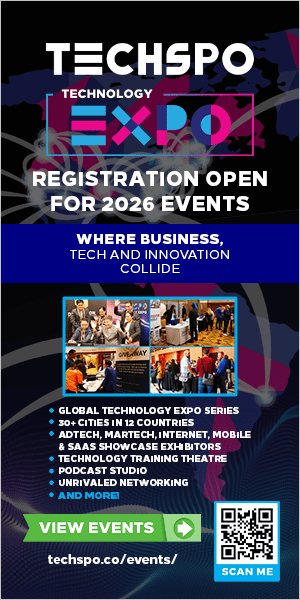What is the MarTech Trend in 2025?
The MarTech (Marketing Technology) landscape is advancing at an unprecedented rate, driven by rapid technological innovations and evolving consumer expectations. In 2025, businesses are leveraging cutting-edge tools to streamline operations, improve customer engagement, and enhance ROI. These advancements are reshaping marketing strategies globally, enabling brands to connect with audiences in increasingly personalized and impactful ways.
TECHSPO is one of the premier examples of a cutting-edge technology expo in the world. We pride ourselves on our partnership with DigiMarCon, bringing the best of marketing and tech together in a truly unique MarTech conference experience. Here’s a sneak peek of the trends you’ll be learning about at your next TECHSPO event.
What is the MarTech Market Trend in 2025?
The MarTech market in 2025 is heavily influenced by artificial intelligence (AI) and machine learning (ML), which have become essential for businesses aiming to stay competitive. AI is now integral to predictive analytics, enabling companies to anticipate customer needs with precision and create highly personalized marketing strategies. Tools like chatbots and advanced automation software are not only improving workflow efficiency but also delivering tailored customer experiences in real time. HubSpot’s State of AI 2025 Report highlights that over 74% of marketers now integrate AI into their campaigns, a significant jump from previous years.
Data privacy and ethical AI have also emerged as focal points in the MarTech landscape. With global regulations like GDPR and CCPA shaping consumer data handling, companies are investing in technologies that prioritize secure, transparent, and ethical use of customer information. This approach not only protects brands from compliance issues but also fosters consumer trust, a critical asset in today’s market.
Moreover, there is a noticeable shift toward sustainable MarTech solutions. Companies are reducing their carbon footprints by adopting eco-friendly software and energy-efficient data centers, aligning their operations with broader global sustainability goals.
What’s New in Digital Marketing in 2025?
Digital marketing in 2025 is defined by dynamic shifts and innovative practices.
Voice search optimization continues to gain traction as voice-activated technologies become a mainstay in households and workplaces. Brands are optimizing content for conversational queries, ensuring they rank high in voice search results and cater to an audience that values hands-free convenience.
Interactive content, such as augmented reality (AR) experiences, gamification, and shoppable videos, is transforming how brands engage audiences. These formats not only captivate users but also enhance conversion rates by providing immersive and action-driven experiences.
Sustainability marketing is becoming a significant trend, with brands emphasizing eco-conscious messaging and practices. Consumers are increasingly drawn to companies that demonstrate social and environmental responsibility, making this a crucial aspect of modern marketing strategies.
Blockchain technology is making waves by ensuring transparency and combating ad fraud. It allows marketers to verify ad impressions and clicks, creating a more secure and efficient advertising ecosystem.
What is the Trend in Content in 2025?
The demand for engaging, personalized, and interactive content is higher than ever in 2025.
Short-form video content remains dominant across platforms, driven by the popularity of TikTok, Instagram Reels, and YouTube Shorts. Businesses are leveraging these formats to deliver concise, impactful messages that resonate with target audiences.
Augmented reality (AR) and virtual reality (VR) are redefining content strategies, particularly in e-commerce and experiential marketing. Brands are using these technologies to create immersive product demonstrations and virtual try-ons, significantly enhancing the customer journey.
Content modularity is a key strategy, allowing marketers to repurpose core content into various formats. For instance, a whitepaper might serve as the foundation for blogs, social posts, podcasts, and video content, ensuring maximum reach and efficiency.
Additionally, AI-driven content creation tools are revolutionizing how marketers produce material, offering capabilities like instant personalization, tone adjustments, and multilingual output. This ensures that brands can cater to diverse audiences without compromising on quality or speed.
What is the Future of MarTech?
The future of MarTech is a landscape rich with possibilities, anchored by AI-powered advancements and democratized tools. By 2026, it is projected that over 80% of marketing functions will incorporate AI, fundamentally transforming how teams analyze behavior, predict trends, and optimize strategies.
Low-code and no-code platforms are making MarTech more accessible than ever. These tools empower marketers without technical expertise to build, deploy, and manage campaigns seamlessly, leveling the playing field for businesses of all sizes.
The integration of Internet of Things (IoT) devices with MarTech solutions is another exciting frontier. By connecting physical and digital worlds, brands can gather real-time insights from connected devices, enhancing personalization and delivering more timely, contextually relevant marketing messages.
Furthermore, the role of sustainability in MarTech is expected to grow. From green hosting solutions to carbon-neutral tools, businesses are increasingly aligning their technological investments with environmental responsibility.
Conclusion
The MarTech industry is entering a transformative era in 2025, defined by innovation, personalization, and sustainability. For businesses aiming to stay ahead, understanding and adopting these trends is crucial. Attending a technology expo like TECHSPO or a martech conference provides a unique opportunity to network with industry leaders, explore groundbreaking tools, and gain actionable insights into the future of marketing technology. Don’t miss the chance to elevate your marketing strategy—register for TECHSPO 2025 today and unlock the potential of tomorrow’s MarTech landscape: Register Here.
Technology Blog
- 1xbet Casino España la experiencia electrizante que transforma tu suerte January 31, 2026
- 22bet Casino España La Aventura Infinita de Ganar y Jugar January 31, 2026
- Aventura desértica en el Sahara Sand Casino donde la fortuna florece January 31, 2026
- The rise of the always-on economy: subscriptions beyond streaming January 31, 2026
- Brilla en el casino sin gastar con el bonus de Slotstars January 31, 2026















